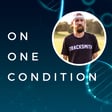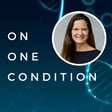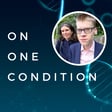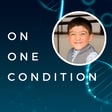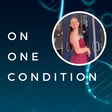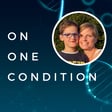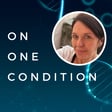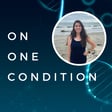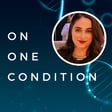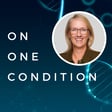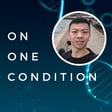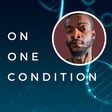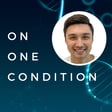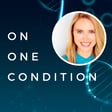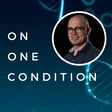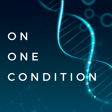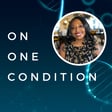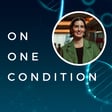Become a Creator today!Start creating today - Share your story with the world!
Start for free
00:00:00
00:00:01

Episode 58: Kelly Kearley - PTEN Hamartoma Tumour Syndrome
Kelly is the mother of Austin, a teenager with PTEN-Hamartoma Tumor Syndrome. She shares her profound journey of navigating life as a parent of a child with a rare disease, battling the healthcare system, and finding joy in small, everyday moments. Kelly’s story highlights both the struggles and triumphs of caregiving, offering insights into navigating the medical system, managing mental health, and finding a new normal. Through resilience, advocacy, and self-discovery, she has turned her challenges into a mission to support others in the PTEN community.
The song that Kelly chose is Stronger by Kelly Clarkson.
Transcript
Introduction to 'On One Condition'
00:00:00
Speaker
Hi, I'm Silvan Biertero, and you're listening to On One Condition, a podcast to raise awareness about health conditions by listening to people who leave them every day.
Meet Kelly Keely
00:00:09
Speaker
My guest today is Kelly Keely, and we're going to talk about her son, Austin, and PTEN-Hamartoma Tumor Syndrome, also known as PTEN. Hi, Kelly, how are you doing? Hi, thank you for having me today.
00:00:26
Speaker
Well, thanks for joining. It's great to have you on.
Coping through Music
00:00:30
Speaker
I always love starting with a song. So which song did you choose and why? Well, straight in there. So I actually chose Stronger by Kelly Clarkson, maybe because her name is also Kelly. I don't know. But really, because the words really resonate with me, I just, you know, it says, you know, you'll come back swinging. And yeah, just you know, I think just everything about i think this whole journey of rare disease, it, you know, makes you a stronger person. And you do have to come back fighting a little bit, you find this inner strength that you didn't even know existed. So yeah, the words just, yeah, I mean, me are quite powerful mean a lot to me.
00:01:14
Speaker
Yeah. Yeah. That makes sense. And I'm sure a lot of our listeners will agree with you. I'm going to hit you with ah with a difficult question straight away. Go on then. If you don't mind. So you mentioned strength and stronger.
The Diagnosis Journey
00:01:33
Speaker
Is that something that you felt straight away when you faced Osteen's diagnosis or not? Definitely not. No. no that was definitely a path that I had to go down. No, I think when your son is first diagnosed with a rare condition, it was more actually, not me sideways, to be honest, it probably, you know, took all the my wind out of me and my strength out of me. And it's something that to you build up again, over time, through, you know, that, you know, through everything, really, through like, knowledge and learning.
00:02:10
Speaker
And the, you know, the fight begins, unfortunately, every kind of milestone and hurdle, and I'm sure we'll get into all the details of it, but it's think, you know, you're just fighting every step of the way for all that you can for your child. So that's kind of how you build your strength back up, I'd say.
00:02:28
Speaker
Yeah. Naively, I wanted this podcast to help people with that. But now I've come to the conclusion that, unfortunately, I feel like you need to experience it in order to find that strength. And that's not something you'll acquire by listening to a podcast or reading books. Do you agree with that or not?
00:02:53
Speaker
I think things like having this podcast or books, you know, resources and listening to other people's stories helps you build that strength. Yeah, you realize that you're not alone. You listen to other people's journeys and think, oh, you know, if they can do it I can do it. So I feel like it's, it's a really important part of the journey. You know, I i said certainly, you know, as soon as I could kind of went out into the world of readies and was looking for anything I could about my son's condition or people that, you know, it also experienced what we'd experienced. And so, yeah, I think i think there is something in.
00:03:31
Speaker
in that, so you know doing i thought yeah, I think this podcast is is very important. Well, yeah, I agree. But yeah, no, I hear what you're saying. It's it's a bit of both in ah in a way.
Understanding PTEN Syndrome
00:03:48
Speaker
So, well starting from the the beginning for you,
00:03:54
Speaker
What is P10 and how did you discover that Austin is affected by it? yeah yes So P10-Harmatoma-Tumor Syndrome. I'll describe it how the genetics described it to us in our in ah and our genetics appointment when Austin was diagnosed. And it kind of stands for P, for the protein on your 10th chromosome. So it's kind of where that forms in your genetic code. But it's not protein like you eat. you know it's not protein It's protein that your that your body kind of makes. And
00:04:30
Speaker
people have P10 and what P10 does in the body normally is it produces a protein that wraps around the cell, um any cell in the body and gives it its shapes and makes it round and then the cell can work with all all the other cells around it correctly. So if you've got a spelling mistake in your P10 or you don't have P10, so there's you know a deletion or an alteration or something like that, then your cells are kind of misshaped basically, so quite a lot in your body can go wrong. um And it can be quite difficult to diagnose because of that, because a doctor might not, you know, not join the dots, as it were. um So for example, a very common and theme, people with P 10, is that they have large heads. And that's actually to do with having kind of more white matter in the brain in between the gray matter and in between the brain cells.
00:05:26
Speaker
so that they kind of have an actual bigger head size. and They can have lower muscle tone, sorry, weaker muscle tone. They can have things like large adenoids, so when you're a baby, it can have like breathing difficulties and everything. um You can have get vascular anomalies, you can get um have bit immune deficiencies. The two kind of biggest symptoms, I suppose, are either you can start to get like multiple cancers in adulthood mainly. And that's because your cells are the different shapes and then they kind of clump together and form tumors. So you can get some kind of benign kind of lumps and bumps, but you can also you know have multiple cancers. So some people can kind of go through their life not really knowing they've got PTAN until their early adulthood. And then it's when they get the second or third cancer in their twenties.
00:06:22
Speaker
um that you you know the doctors might go oh hang on what's going on here and then you do further tests so that that can happen quite a lot And then we have the flip side of the coin where P10 can actually affect neurodevelopment. And this is what happened with my son.
00:06:38
Speaker
um So along with his larger head and lower muscle tone, he wasn't meeting any of his milestones as an infant.
Austin's Health Challenges
00:06:45
Speaker
so And he had learning disability. And um and Austin, I thought, she's very severely mentally disabled. He's 13 now, but he probably cognitively functions at roughly a four or five-year-old.
00:06:57
Speaker
um He's non-verbal, so it can kind of you know cause the autism and learning delay. But that's not with everyone and that's why some people get to adulthood and then it's the cancer. So there's kind of these two, almost these two separate communities almost within our PTEN community. Okay. Wow, you've described a lot of symptoms. ah So is Austin experiencing all those symptoms?
00:07:27
Speaker
No, so I suppose, so for Austin and our journey, he was born with the larger head. So I had lots of scans before birth because they wasn't they weren't sure what was going on. um And they had the low muscle tone. um And they do have, they also have something called cafe au lait patches, which are like a little birthmarks, but very, very light birthmarks. And that's how our geneticist diagnosed us or said she would like to test for P10. And that's because of the large head, the cafe au lait patches and the low muscle tone and the learning difficulty. Those four things were a combination of what, why they concluded and wanted to test for P10 for Austin. In his infancy, we we had quite a lot going on. Like I said, like they thought he had meningitis, he had bronchitis. And again, it was that thing before he got diagnosed, it was them not putting all the dots together. So he kind of had lots of things going wrong as he was developing. But actually from the age of about
00:08:21
Speaker
five, six. It's our daily life of living with somebody with a severe learning difficulty and autism and being non-verbal. That dominates our life, if that makes sense. it's not you know but He has an annual thyroid screening that started at the age of 10.
00:08:41
Speaker
But really it's learning it's just it's just living with the with the learning difficulty for now. We're not obviously not sure what's going to happen in the future and he's going to have you know annual cancer checkups. But yeah, thus that's kind of where we are at the moment.
00:08:55
Speaker
yeah yeah The thyroid screening, is that for cancer prevention in a way? or Yes, so thyroid cancer is known in P10 patients to be one of the first cancers that comes on. so normally, and I think I suppose that's like with teenager, you know, hormones and puberty and all that, you know, and that it kind of causes the onset of cancer. So a lot of teenage boys that I've met with P10 will have their thyroid out at like 16, 17, 18, if they if they see pre cancerous cells, so that's why they start scanning. And obviously, like any rare condition, there's different guidelines, unfortunately, depending on what country you're in. So in America, they'll scan
00:09:44
Speaker
literally from day dot and when you get diagnosed, you'll so be scanned, at you know, age 345. In the UK, they scan from double figures normally, so from the age of about 10.
Managing PTEN Risks
00:09:56
Speaker
And then again, it has to be weighed up with You know, we want to keep on top of it and we have, we want to understand if Austin is developing anything, but we also have to take in into consideration that he's got a severe learning difficulty, he doesn't understand the scans and can get quite distressed. So we don't want to be doing them all the time. So it's, it's juggling that, you know, things like blood tests and that type of thing. So we have to work way up like how much about prevention, and you know, kind of screening do we want to do.
00:10:28
Speaker
And then they have the yeah and then they have kind of different screening guidelines for the different cancers. Yeah, I was about to ask about how you approach those procedures because people with autism, like anything that touches the skin, for example, anyone who enters their personal space can be felt as an aggression. So how does he manage those days where you have to go to the hospital?
00:10:56
Speaker
Yeah, so it's been a big learning curve. and When he was really little, you know, we had to do quite a lot of tests and take blood tests and everything. Unfortunately, it would be almost needing four of us, you know, to help him try and get a blood test. For example, like he'd have to sit on my lap, I'd be trying to calm him, my husband would be holding his arm, there'd be another nurse there trying to, you know, to do everything for the blood, then one take the blood and all that. And it was kind of quite a big operation, as it were.
00:11:22
Speaker
um And he would get unfortunately quite distressed. yeah and You know, you go through all these kind of different procedures and that's when you have to weigh up, you know, if you need them or not. In terms of the scans, and we actually were put in touch with a disability a learning disability nurse.
00:11:40
Speaker
This was down at the Southampton General Hospital and they were fantastic. And we we filled in an autism passport and it is coloured like, it's like a traffic light system, like red, yellow, green. So they send it to you, fill it all in. And it's very detailed. It's things like how do lights, you know, affect noise, people, time of day, you know, medication, everything. How does he eat and drink and get drunk in case he has to stay in overnight? You know, literally everything is brilliant.
00:12:10
Speaker
And then we you know I obviously sent that back to the to the hospital. And I was in discussion with him before his first thyroid screenings. They sent sent me the gel in advance. So then at home, i I'm putting the the screening gel, um like on his neck, and I was doing it like in the bar so then we could wash it off. So I was getting him to touch it and feel it and put it on his own neck and then we're rubbing it on his neck. And and because he doesn't have, obviously I'm not aware that he'll have like long term memory, I don't know how long he'll keep things in his memory. I start about maybe two weeks before, maybe one week before, we you know, just every other day, that kind of thing. And then we build up until the day of the, you know, the day, the night before where we're doing it.
00:12:51
Speaker
every day. So then when we get to the to the hospital, and he lies down the bed and go, Oh, look at this gel, he almost is putting it on his neck, he kind of knows where it where it goes. And we've already practiced with a shampoo bottle rubbing it on his neck, you know, like, so like, he's got pressure of something, you know, or like, you know, like a TV remote or something. So he kind of understands he's going to have a bit of, so it's, you know, so he's not scared and frightened when that actually happens. Yeah. And then it was absolutely amazing. We went down there for our first screening when he was 10. And a nurse came, well, first of all, we got put into a side room, we didn't go in with everybody else. We got an appointment at the end of the day. So it was very quiet.
00:13:33
Speaker
The nurse came in and, you know, kind of whispered, is this Austin? I was like, yes, this Austin. And we went out to the corridor. There's hardly any lights on. We went through this door and there was basically no lights on. It's very dimly lit and it's very quiet. There was no beeping. There was no machines. I kind of thought we'd been taken through the wrong door almost. It was like, you know, like, you know, like, oh, it's all it's empty here. It's closed. um But they actually purposefully, you know, set up the whole the whole area.
00:14:01
Speaker
And there was um the doctor in there and a nurse and he very gently, you know, spoke to Austin very quietly and he was like, oh, would you like to come and sit on here, Austin? And, you know, kind of let him settle in. And it was just absolutely incredible. And because of everybody's efforts.
00:14:16
Speaker
We were in and out within 10, 15 minutes. There was you know no distress. He knew what he was doing. He was happy. And because of that, we've now managed to go every year and you know and have a similar experience because he's not afraid of it. saying Yeah.
Struggles and Support Systems
00:14:32
Speaker
That's incredible. My daughter is autistic and I've never experienced anything like this. You've described the the biggest challenge, which is preparing them for what they're going to experience. And you can use as many words as you want, but they need to feel it in order to actually be mentally prepared. So yeah, it sounds incredible. I think you've found a great hospital there. Well, already very interesting.
00:15:10
Speaker
Let's carry on with that actually. So you've described the support you get when you you go to those hospital visits. I imagine that you require a lot more support for Austin. Do you find what you need or is it a ah battle like I think you said earlier? Yeah, I presume you mean support like an everyday life. Yes.
00:15:34
Speaker
we We have got the support we need, but because I have battled for it. So that's to answer your question. as you yeah So we've we've actually moved halfway up the country. we we I'm from Sussex, I'm from Brighton, and we've moved up to the West Midlands. And that was to get him into a school that we found and we fell in love with. It's a school, there's only 50-odd children there, they've all got a one-to-one.
00:16:01
Speaker
So there's obviously like the 50 staff, but then you've also got other staff supporting them and around, you know, doing all the activities so that the day is, they don't have a timetable. It's called kind of called the daily flow, as it were.
00:16:14
Speaker
So they do, you know, there's no kind of time pressure and they learn isn't very much outdoors. They'd come do, they do woodwork, metalwork. There's a farmyard. They they grow animal and plants and that kind of thing. So it's all very like you said, feeling and sensory. um And when we found this place and fell in love with it, that's why we literally moved up, you know, up the country. But it wasn't easy to get him in. We had to move there before we had a school place. So we had to risk everything. We then had to battle with the local authority.
00:16:43
Speaker
again. and We'd already we've already been through a court case ah about five years ago to get him all the therapy he needed and we had to then do it all over again in the West Midlands and you know we had to prove there was nowhere else that would take him or understand him or give him the support he needed.
00:17:01
Speaker
so it's everything is a battle and you know and now we've also got he goes to a respite center one evening every other week and he stays over which is amazing um it gives him that slight independence you know he's a teenager he needs to have that he's with peers and they do you know there's there's a trampoline in the garden or there's a little kitchen and they do cooking or you know they have meals together and they go out into the town with carers. um And then it gives me and my husband and my other son a bit of a rest as well, which is very important. So we have got all that in place. But again, you know, we've had that new took a year to set up, you know, we had to have interviews and social services and, you know, everything is you're having to prove, you know, the support you do need, then you're having to fight for it. And it's and it's exhausting because it's on top of your daily life, which is also hard.
00:17:54
Speaker
and yeah yeah Yeah. It's easy to to think, well, once we've had the diagnosis, things will just fall into place. But at least in this country, in the UK, it's the opposite that you you need to make sure you ask the right questions to the right people, otherwise you don't get anything. It really frustrates me Yes, I hear your frustration. And I don't want to feel ungrateful for what we do have, because we have got kind of care is in place now. And we've got, like I said, the respite center in the school. And, you know, I'm very grateful for all of that. But I'm also aware of the struggle and the battle that a lot of people go through, you know, to get what they can. And there isn't a guidebook, right? You know, you go to this genetics appointment, oh, you're given this, oh, now you've got this diagnosis, and then off you go.
00:18:47
Speaker
you know, and then you're having to find your feet, you know, and you're also trying to work out what the diagnosis means, medically. But then you're also then having to think, well, how do I get support? And how do I get help? You know, so and then there's no like, I don't feel like there's like one place that says, you know, you should apply for all of this, you work out that you can have things like DLA or a blue badge,
00:19:08
Speaker
you can get like a personal budget to help you with the social care for them, you know, to help pay for the carers or carers allowance or support, you know, and all there's like so many different elements and it's trying to work out what you're, what you're entitled to and what you can get, but, and then you're having to fit around all that all around.
00:19:25
Speaker
your daily life, you know, so you're kind of working, you know, with whoever you're caring for. And in this instance, you know, Austin's needs one to one care constantly when he's in the home, because it's like having a six foot toddler in the house. So it's only when he goes to bed, then I can, which is my rest that I can then go, right, now I'm going to do research. And it's, you know, it's mentally exhausting. So you can understand why people don't cope or find it difficult.
00:19:51
Speaker
Yeah, yeah, yeah. So you mentioned having some respite.
Coping with Personal Loss
00:19:57
Speaker
How else do you cope? How how easy or difficult is it?
00:20:03
Speaker
Yeah, interesting question there. So first of all, I'd like to say that it's taken me 10 years to work out how to cope. I think that's really important. I'm not just kind of sitting here going, yes, I can cope. um And I actually went had depression for the first five years of of Austin's diagnosis, and having to find myself again, because you lose yourself, you know obviously you've got all this pain and this upset and this worry about having this disabled child, but then on top of that, you become a carer. So then you you lose your identity and your career and your loves and your life in that you know in that sense. So it's like this loss in lots of different senses of the word. And then it's about rebuilding and rediscovering yourself and rediscovering
00:20:52
Speaker
your new normal, I suppose, you know, you know what what is, you know, and I know, like, no one ever really knows, you know, what life they're going to have. But when you're pregnant, and you have a baby, you don't go into pregnancy and having a baby thinking you're going to have a disabled child, you know, so it doesn't, you know, it kind of feels like you weren't expecting this, you know, so you have to readjust everything.
00:21:17
Speaker
And it is about the slow steps and re-finding of, you know, yeah, kind of just working out who you are now. You know, the Kelly I am now is not the Kelly that was, well, five years ago or six years ago in the midst of my depression. And then again, 10, 15 years ago before I had Austin, you know, you kind of constantly having to reinvent yourself, aren't you? And it's about, yeah, do I suppose just working out the new normal for you and your family.
00:21:44
Speaker
Yeah, with hindsight, do you know what caused the depression and how you got out of it?
00:21:56
Speaker
Yes, well, I've now trained and I've disqualified to be a counsellor. I've got quite a lot of knowledge now about what caused my depression. And, i'm you know, I think it it depression is kind of like you go on that on that that grief cycle. Yeah, so you kind of You know, I look back and I can see that, you know, from the day that Austin was diagnosed, I literally obviously go into like shock to begin with. Nothing kind of feels real. And then you go into like a denial phase.
00:22:31
Speaker
which is almost this phase where you're bargaining or, you know, i'm um'm um I'm personally not religious, but I could almost felt myself bargaining with this higher being being like, please take, you know, give Austin my P10, I'll have his or, you know, and obviously that can't happen. But you know, anything like that, where you're just trying to make sense of it and find a way out. um So you kind of go through that. And then when there isn't any answers, because you can't change the situation, you kind of go into like a great into an anger stage, you know, and I'm just just annoyed with everything in life. Yeah, angry with myself, because
00:23:09
Speaker
you know, had I caused this to Austin, you know, I was the one that grew him angry with the world, you know, that why him? ah Why does you know, why is he being, you know, given this rare condition, which means he won't have the life that I felt the normal, you know, vertical is that life that he should have, you know, you kind of get angry with people around you because they're trying to comfort you and say things like don't worry you will talk one day or no you won't get the kind of whatever you know the platitudes and that's obviously because they don't know how to cope either but it just really irritates you because you're thinking i don't this isn't helping i don't want to hear this because it's not you know reality so you kind of so you kind of spiral through all these you know and then you kind of sink into this sadness and this depression i suppose where you're having to grieve and come to terms with it i suppose
00:23:58
Speaker
And then it's slowly working your way out of that into acceptance, I suppose, and a new like I said, like this new normal and this new kind of lot way of life and finding the joy and the happiness and the contentment in just everyday life that you have in your, you i know, your in your new world. if you said me like in so it's You can kind of see them. And that that took me five years. Sometimes people can do it in a year. It took me five. And those five years you have to fight with the system. Yes. So that that that's how you build strength, no doubt. Yes. Wow. Yeah, that's impressive. So I'm going to hit you with a hard question again. I'm sorry. No worries.
00:24:48
Speaker
but you talked about acceptance. And before that, you mentioned the fact that when you expect a child, you you have an expectation of what their life is going to be. So this acceptance of Austen's life, do you have a better understanding of what it's going to be like? What, his life? Yes. Yeah, I suppose you know, it's coming to terms with accepting that, you know, he, you know, he won't speak, for example, and which is, you know, it's a really big thing to have a child in in your, you know, that you love today, they can't speak to you. You know, you can't ask them how their day was, or they can't tell you if they're feeling ill. And you can't even ask them, you know, you know, you can't sing A Christmas Carol together, or birthday, or, you know, he he doesn't understand things like films or books, because he doesn't, he can't
00:25:43
Speaker
follow a narrative and you know and a story and all that.
Finding Happiness and Acceptance
00:25:47
Speaker
You have to kind of come to terms with all of that, I suppose. And then you know and that's just one aspectset aspect of you know of his life, his low muscle tone or you know the fact that he won't you know he's not going to go to senior school on A levels and get a degree and get a nice job or but whatever he wants to do. well But actually,
00:26:06
Speaker
That's my understanding of the world before I had Austin and vital norms and expectations of what a happy life is, right? You know, I was brought up to, you know, you know go and fight and go and get the career that you want and, you know, and then find a loving partner and settle down and have children, whatever. And that's kind of like the narrative that's formed around what a good, happy life is, if that makes sense. But actually having a child like Austin, you're like,
00:26:35
Speaker
I look at him and he is very happy. You know, he, you know, this is what I've had to come to terms with like, my, my sadness, my depression is mine, right? It's not his. He doesn't understand what, if you want to call it missing, he's not what he's missing out on. He doesn't, he doesn't get social interaction. He doesn't, you know, he doesn't crave friendships. As long as he is obviously warm and fed and loved and has his iPad. and He loves chocolate biscuit. He loves going out on his trampoline. He likes going horse riding. You know, you find all the things that he loves and enjoys in life. he He is enjoying, he is happy. He's very content. I can tell when he's not. So I know that, you know, I know that nine times at a time, he is happy and content. Therefore, who am I to judge about who's
00:27:29
Speaker
who's got the better life or what he's missing out on, right, you know, he's, he's enjoying his life, he's never gonna have to have a bill to pay or mortgage, or worry about his children, he's not gonna have children, you know, so in a way, you know, he's happy. So yeah that's what, that's where my acceptance is now.
00:27:48
Speaker
Yeah, that's a very important message. It's difficult to to understand, I imagine. Hearing you, you leave it every day and you see him and ah it's interesting because it's a redefinition of happiness.
00:28:08
Speaker
That's not based on what most of the population expects, but it doesn't mean that it's wrong or all that it doesn't lead to joy. So that's very important and yeah, thank you for sharing that.
00:28:25
Speaker
So I'd like to switch to a different topic, which is probably a bit easier. You'll be relieved. ah So you you mentioned that you've started counseling or you're going to start being a counselor soon, but you've also told me that you started the patient support group for P10.
Building a PTEN Community
00:28:50
Speaker
Would you be able to tell us a bit more about that?
00:28:53
Speaker
Yeah, so I'm the charity manager for P10 UK and Ireland Patient Group. um And in a nutshell, that came about about seven or eight years ago, um Austin's geneticist got all the patients that she knew at the time, or that were under her um service together and kind of said, look, in order to get anything done in the rare disease world, you can kind of need to have a patient voice as it were and be a collective.
00:29:19
Speaker
and asked some patients and parents if we would come together. So I put my hand up as well, because I didn't have enough to do at the time. i will But it was really important to kind of, you know, be part of that community. You know, we found other people that were affected by P 10, which obviously wouldn't, you know, wouldn't wish on anyone. But because we had found these people, I was very grateful to be part of this community. So Yes, so I became a trustee. And over the time I then became the charity manager. And we put there's about three or 400 people, approximately with P 10 in the UK. So we provide services like we put on a patient day once a year where we all come together. We do monthly online zoom sessions called P 10 power hours where we speak different doctors come on and talk about how P 10 affects the thyroid or the bowel or
00:30:13
Speaker
um and we it's like a support group in that sense. um And then because mental health, my journey was such a big, important part of my experience, actually, and at one of the other patient days after COVID, um I asked the patient population what they wanted. And I think because of COVID, particularly, ive everyone was saying they were struggling with their mental health.
00:30:37
Speaker
So I went and managed to get a national lottery grant. I've had two grants now where we, so we now partner with um a company called Rare Minds who specialize in rare disease counseling. We've now got two counselors that have learned all about how P10 affects you as a family or as a patient. And then and then also so they've got their counseling skills. So now our national lottery funding will fund anybody affected by P10 if you're a carer, a family member, a parent, a patient. um Unfortunately, we can't go to under 16 at the moment. We are looking to hopefully um do something for the children as well. But at the moment, it's 16 plus. Yeah, so they they can have like counseling sessions. And like that was really an amazing milestone for me because when Austin was diagnosed and I eventually decided I needed counseling,
00:31:31
Speaker
I was looking for somebody to help me on my journey. But, you know, you could find bereavement counsellors, you could find couples counselling, you know, you know, what I call like, you've always want to find a counsellor that knows what you're going through. And I know counsellors are, you know, and I've trained to be a counsellor since so, you know, they have training, they can help with anything. But I think when sometimes when you go to counselling, you want to speak to somebody that that kind of gets it. And I'm not saying I was looking for a P10 counselor, particularly, but I was looking for a rare disease or, you know, like somebody that would help with that kind of counseling, like diagnosis, medical, that kind of thing. So to now have a P10 counseling service for me is, you know, one of the massive achievements, I suppose, that we've managed to do in the last 10 years. And then off the back of that separately,
00:32:20
Speaker
I've literally just finished my course in the last couple of weeks. So I'm just qualifying now to be a counsellor. And that is separate from the P10 counselling. I won't counsel the P10 community because that's kind of, you know, you kind of... Too close to home. i Yeah, it's like, kind you know, contradiction type thing like, but I will, I do want to be a counsellor for in the rare disease space in general, and people that have been diagnosed with a medical condition.
00:32:47
Speaker
people that are carers, because I think a lot of people end up being a carer in their life. So that's yeah the the path that I will take on top of also running the charity. So I want to kind of have two hats on, as it were.
00:33:00
Speaker
Yeah. Plus being a mum. Oh, yeah. And that doesn't go away. Well, that's incredible. And it sounds, like ah I'm just making assumptions here, but it sounds like with the PTEN patient group, you're kind of finding what you would have needed when you started on your journey.
00:33:25
Speaker
Do you feel like you've made like real impact on on people's lives? Have you seen changes in the UK? Yeah, I hope so. um I feel like when we come together as a group um annually for our patient day and seeing all the families around.
00:33:41
Speaker
i would I would have loved that when Austin was diagnosed. you know and you know Patients do come up to me up at the day and say, wow, you know my son was diagnosed last month or you know back in you know back in the spring or whatever. and we you know And we were told about this day and thank you so much. And we've connected with other families. And so I do hope that yeah that's kind of provided some kind of support for the PTEN
Reflecting on Growth and Joy
00:34:05
Speaker
community. And we're always but constantly asking the PTEN community, what you know, what would they like in the future? I've just sent out a newsletter this week to ask them what they want for 2025. Because I feel like the charity is for them, right? It's a patient group, I'm working for the community. So I need to hear from them and what they want. And then I will do my utmost to go out and get it. Whatever that whatever that is. And I think, deep down, a lot of it is just to do with no other people that are on the journey.
00:34:37
Speaker
and other patients that are going through ah you know similar similar things in life and just having that sense of community. Yeah, yeah. And we'll put links to the patient group and rare minds on the website so people can find them easily. That'd be great, thank you.
00:34:58
Speaker
you know I'm taking notes and I'm looking back at my notes. and The first word I wrote is stronger, which is in relation to the song you chose. ah It's incredible how I can feel the journey you've been through.
00:35:18
Speaker
and like found a mission in a way with the patient group, found a career as counsellor. So definitely the right song and because it sounds like you're much stronger, maybe in a different way than before you started your journey. Does it feel like it? Yeah, I think talking about it as well in this forum, it brings it all back, but you kind of you know, you summarize everything and then you sit here and you think, oh wow, we have been through a lot. You know, and I haven't even touched on, you know, half of it, but it just, it does sometimes, it makes you stop and take notice, I suppose, and and take stock of kind of what what you've been through and how far you've come and where, you know, where I am now. Yeah, and and I think that's that's a really good thing to do because some days when it gets hard,
00:36:16
Speaker
And, you know, you might have a down day and you know it's nice to kind of reflect and think, no, we have come from, you know, we've done everything that we can for Austin and we've given him the best life that we can. And also around that, I've then developed and created a different path for me as well. You know, and I've, you know, and I've come out stronger and in a very different place, but actually very grateful to Austin and everything that he's brought to our family.
00:36:46
Speaker
Amazing. It's interesting because everyone needs to do that, like stop and appreciate what you've done, no matter what you go through. But I feel like we don't do that or not enough at least. I wish we could carry on talking because it's extremely interesting and so nice talking to you. But I'll just ask you one last question.
00:37:14
Speaker
What is Austin's happy place? A place where he feels at peace. Austin is very happy on the sofa with his iPad but also kind of next to me. As soon as I sit down in the evening he'll come and find me. it's all It doesn't matter where he is, he might be on his swing swinging about flapping about, weren jumping about, but it's almost like, oh, mummy's resting and he'll come over and he'll sit next to me and he gives me his feet because he loves his having his feet rubbed and he'll laugh and he'll i' almost like put his face into me and he just likes to sit and you know and he he really likes if I've got some more teasers or something. So kind that is Austin's happy place and my happy place.
00:38:07
Speaker
Nice, nice. It's been lovely talking to you. I feel like people can use this discussion we've had to to get some real good tips about how to cope when you when you get the diagnosis, for example, and and what tools to to look for. So that's that's very, very good.
00:38:33
Speaker
I wish you the best of luck in your new adventure as a Councillor. Thank you so much for the opportunity to speak to you today as well. really yeah It's been a bit of an emotional journey but I'm really pleased to get it out there because I think you know any any help and support I can give to others um is is really valuable as well. So thank you very much.
